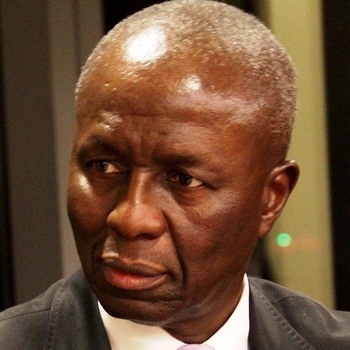DOCTOR OF PHILOSOPHY (HONORIS CAUSA)
 Dikgang Moseneke was born in Pretoria on 20 December 1947 where he also completed his schooling. At the age of 14, he joined the Pan-Africanist Congress (PAC) and the following year, was arrested, detained and convicted of participating in anti-apartheid activity. He spent ten years as a prisoner on Robben Island, where he met and befriended Nelson Mandela and other leading activists.
Dikgang Moseneke was born in Pretoria on 20 December 1947 where he also completed his schooling. At the age of 14, he joined the Pan-Africanist Congress (PAC) and the following year, was arrested, detained and convicted of participating in anti-apartheid activity. He spent ten years as a prisoner on Robben Island, where he met and befriended Nelson Mandela and other leading activists.
While imprisoned, he obtained a Bachelor of Arts in English and political science and a BJuris degree and later completed a Bachelor of Laws, all from the University of South Africa. During this time, he also served on the disciplinary committee of the prisoners' self-governed association football body, Makana FA.
Moseneke started his professional career as an attorney’s clerk at Klagbruns Inc in Pretoria in 1976. He was admitted as an attorney in 1978 and practised for five years at Maluleke, Seriti and Moseneke. In 1983 he was called to the Pretoria Bar. His application had sparked a dispute within the Bar which culminated in its abolishing its "whites-only" membership rule.
Moseneke practised as an advocate in Johannesburg and Pretoria and was awarded senior counsel status ten years later. He worked underground for the PAC during the 1980s and became the organisation’s Deputy President when it was unbanned in 1990. Moseneke also served on the technical committee that drafted the interim constitution of 1993. In 1994, he was appointed Deputy Chairperson of the Independent Electoral Commission, which conducted the first democratic elections in South Africa.
In September 1994, while practising as a silk, Moseneke accepted an acting appointment to the Transvaal Provincial Division. Between 1995 and 2001, however, Moseneke left the Bar to pursue a full-time corporate career, most famously as the chair of Telkom.
In November 2001 Moseneke was appointed to the High Court in Pretoria, by then President Thabo Mbeki and a year later, was made a judge in the Constitutional Court. In June 2005 he became Deputy Chief Justice. On 4 November 2013, Moseneke was appointed Acting Chief Justice during the long-term leave of Chief Justice Mogoeng Mogoeng.
Moseneke is regarded as one of the strongest judges on South Africa's Constitutional Court and has made a significant contribution to South African property law. He penned the Constitutional Court's last three majority judgments on the Restitution of Land Rights Act and decided a leading case on expropriation in 2014. Most celebrated, is Moseneke's judgment in Glenister v President, co-authored with Justice Edwin Cameron, which struck down amendments to the National Prosecuting Act and South African Police Service Act on the basis that they failed to create an "adequately independent" anti-corruption unit. This was hailed as an "imaginative" and "brilliant" judgment by commentators and means South Africa must have an independent corruption-fighting agency notwithstanding the ruling ANC's controversial disbanding of the Scorpions.
Before his judicial appointment, Moseneke had succeeded, as a litigant, in having South Africa's racially discriminatory system of estate administration declared constitutionally invalid. He retired from the Constitutional Court in May 2016.
Justice Moseneke has six honorary doctorates and numerous domestic and international awards of excellence including Global Jurist of the Year, 2015 under the auspices of the United Nations and Northwestern University, USA. In 2006, he succeeded Justice Richard Goldstone as Chancellor of the University of the Witwatersrand. He was also named as an executor of the will of our namesake, Nelson Mandela, who died in late 2013.
For his "towering legal mind", his "commitment to fairness and justice" and as "a most independent-minded and imaginative jurist", it is an honour for Nelson Mandela University to confer the degree of Doctor of Philosophy (honoris causa) on Justice Dikgang Moseneke.